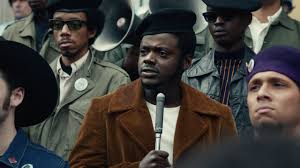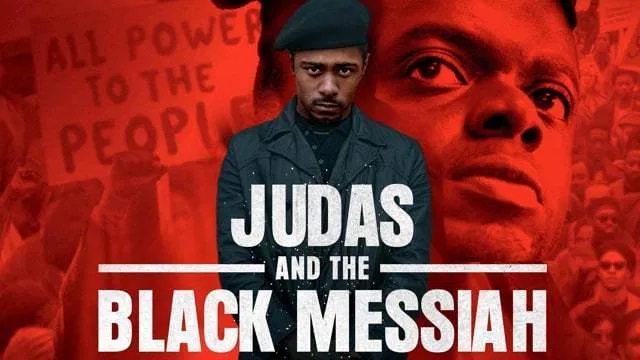Judas and the Black Messiah is the first movie to make me cry in 2021.
If you haven’t heard of this movie, here’s the rundown; Judas and the Black Messiah is a dramatization of the life and times of Fred Hampton, chairman of the Illinois chapter of the Black Panthers in the late 1960’s. The movie flips between Hampton’s perspective and that of William O’Neal, the small-time car-jacker turned FBI mole who infiltrated the Black Panthers.
You already know how this story ends.
A good man does all that he can to push forward an agenda of caring for those in his community and abroad. He leads a chapter of a national political party that exists to elevate black folks and pursue their interests and a better quality of life.
The organization creates “survival programs” like Free Breakfast For School Children, Free Ambulance, Free Employment, Free Busing and the like. The organization’s leaders are revolutionary, even theatrical. Our man is one of those leaders. He is a poet that says that a war is being waged on his people, and the only way for the people to fight is to unite.

Members of the organization carry guns, and even patrol majority black neighborhoods to prevent crime or abuses by the police. This movement, this push for independence is so terrifying to the leadership of America that they do everything they can to tear it to pieces. The American government and the press indeed wage war on the organization, and our man, Mr. Fred Hampton is a casuality in that war.
I am a Revolutionary
Judas and the Black Messiah is about the leadup to Fred Hampton’s murder by the FBI. We get to watch the men who made it happen, most prominently “Wild Bill” O’Neal. O’Neal is played by Lakeith Stanfield (Straight Outta Compton, Get Out, Sorry to Bother You) Once again, he delivers a pitch perfect performance. He portrays O’Neal as a twitchy, morally dubious man caught in the gears of a government plot to destroy the Black Panther Movement from the inside out.
Without getting into the technical aspects of filmmaking, the pace of this movie is airtight. This isn’t an action flick, but every spoken word has that kind of Tarantino style tension to it. Fred Hampton was a man of action, but he was also a man of words. Daniel Kaluuya (Get Out, Black Mirror, Black Panther) portrays him with a patient, deliberate calm hiding a blazing passion for justice. He’s like a coiled spring in every scene he’s in. And he rightfully steals the show.
We follow O’Neal as Fred Hampton forms the Rainbow Coalition. And we see his false charge and jail time, and the police raid on the Chicago Chapter’s Headquarters. Then we watch the community come together to rebuild it. When Fred gets out and comes home, and sees his office brought back, it’s transcendent. I’d call it the emotional core of the movie; a quiet message buried in the heart of this tragedy. Wherever people are, there is power, and power can be used to heal.
A Different Perspective
We also get to see the Fed’s perspective. As an audience we learn how the fear of the people’s power and the potential for black folks to rise into their own halcyon days threatened white supremacy.
The rest of the movie is like watching a car crash in slow motion. It is painful and horrible, but between the violence and the conspiracy, Judas and the Black Messiah takes time to methodically show the reasons why we fight. What we’re fighting for right now. The credits end with a link to Participant.com/Action, and a simple epitaph: “Join the Movement.”
Would I say Judas and Black Messiah is a good movie? Absolutely. It’s a gripping dramatization of the life of one of our strongest voices and the events leading up to his murder. It is brilliantly acted and beautifully shot. If you’ve got HBO, or even if you don’t, you should definitely check it out.

